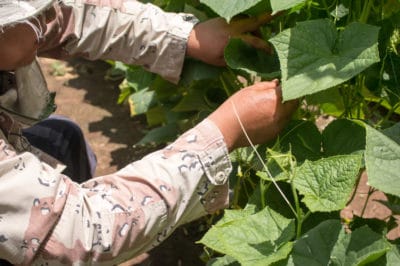Benefits of Pruning Cucumbers
Every climbing cuke vine sprouts many lateral shoots from a central stem, or leader. If all of these shoots are allowed to grow, the vines will have more fruit than they can feed and stop blooming. Pruning keeps them from over-producing, so the flowers and fruit keep coming. It also removes foliage that could block the sun and hide disease-transmitting pests.
How to Prune
To avoid harming your vines, use a sharp pair of pruners or simply pinch what you’re pruning off at the leader with your thumb and forefinger. The goal is to create a single, high-yielding stem.
Expert gardener’s tips:
- This pruning technique applies only to self-pollinating cucumbers grown on a trellis or other vertical support.
- Suitable cuke varieties for this method include disease-resistant ‘Corinto’ and ‘Socrates.’ Both produce 7- to 8-inch slicing cukes ready to harvest in just 48 to 52 days.
Cucumber Nodes
At the point where each cuke leaf attaches to the leader, you’ll find a node with:
- A sucker or growth point
- Flowers and/or fruit
- A tendril for grabbing onto the nearest support.
The nodes are where all the pruning takes place.
Pruning Large-Fruited Cuke Varieties
For cukes with fruit measuring 7 or more inches, prune the lowest four to six growth points when they’re 1 to 2 inches long and all the tendrils. Prune the first few flowers as well. Doing this prevents crops from developing before the plants can support them. After the vines have seven true leaves, prune all but one flower or fruit from each node.
Pruning Small-Fruited Cuke Varieties
Cukes that produce fruit measuring less than 7 inches can support several flowers and fruits at each node without a problem. As long as they’re growing vigorously, it’s fine to let them bloom and bear fruit from the first node upward. In their case, only the tendrils need pruning.
